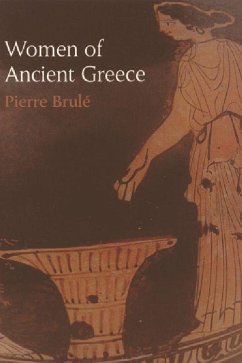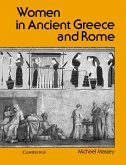Pierre Brule's evocation of how women lived in ancient Greece describes every aspect of their lives, from the most public to the most intimate. He outlines their religious, familial and domestic duties, and their economic importance. He considers their social, moral, and legal status as wives, cohabitees, or slaves. He examines the sexual roles of women, what the status was of a woman's body, and how her own and others' attitudes towards it might vary according to her class. Professor Brule does all this in the context of the development and achievements of Greek civilization.
Pierre Brulé's brilliant evocation of how women lived in ancient Greece describes every aspect of their lives, including their religious, familial and domestic duties, their economic importance, and their social, moral and legal status as wives, cohabitees or slaves. He examines their sexual roles, what the status of a woman's body was and what her own and others' attitudes were likely to be towards it. Professor Brulé does all this in the context of the development and achievements of Greek civilization. Women appear not to have been highly regarded in ancient Greece, with female infanticide a common practice. Strains of misogyny can be heard in Greek literature, drama and philosophy: 'The most unintelligent people in the world' is how one character refers to women in Plato's Symposium (which also features Diotima, his best-known female sage). Women had few duties beyond the home, and the evidence that they existed at all is tantalisingly small. Yet by piecing together fragments and clues, the author gives us a vivid account of women's lives in Greece 2,500 years ago.
Hinweis: Dieser Artikel kann nur an eine deutsche Lieferadresse ausgeliefert werden.
Pierre Brulé's brilliant evocation of how women lived in ancient Greece describes every aspect of their lives, including their religious, familial and domestic duties, their economic importance, and their social, moral and legal status as wives, cohabitees or slaves. He examines their sexual roles, what the status of a woman's body was and what her own and others' attitudes were likely to be towards it. Professor Brulé does all this in the context of the development and achievements of Greek civilization. Women appear not to have been highly regarded in ancient Greece, with female infanticide a common practice. Strains of misogyny can be heard in Greek literature, drama and philosophy: 'The most unintelligent people in the world' is how one character refers to women in Plato's Symposium (which also features Diotima, his best-known female sage). Women had few duties beyond the home, and the evidence that they existed at all is tantalisingly small. Yet by piecing together fragments and clues, the author gives us a vivid account of women's lives in Greece 2,500 years ago.
Hinweis: Dieser Artikel kann nur an eine deutsche Lieferadresse ausgeliefert werden.








